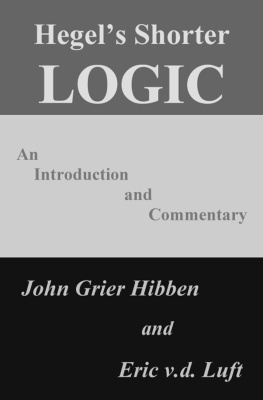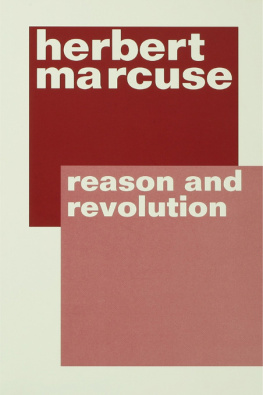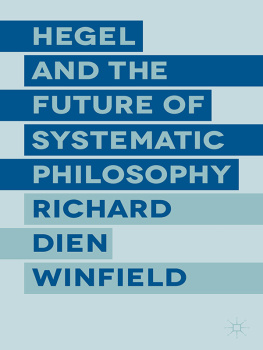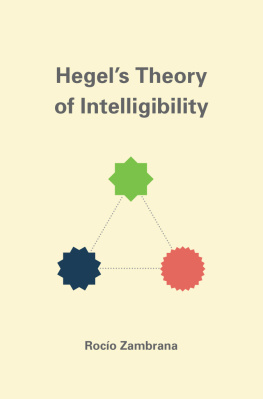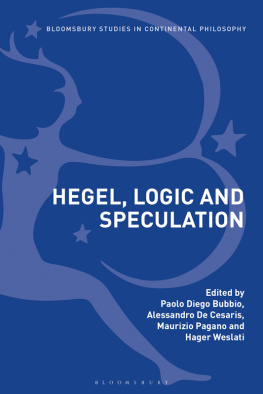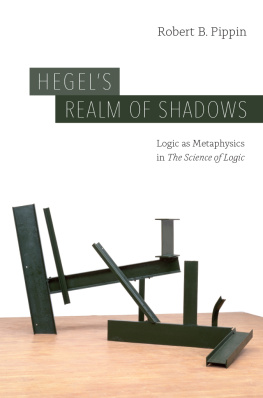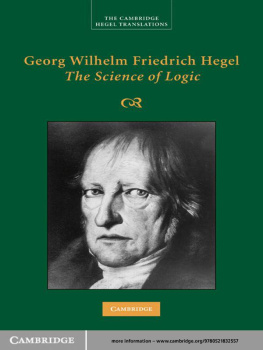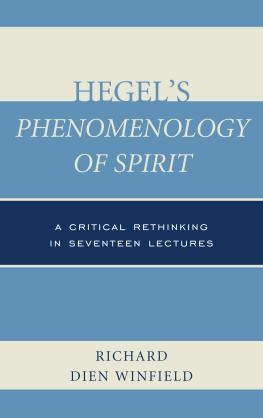Hegels Science of Logic
Hegels Science of Logic
A Critical Rethinking in Thirty Lectures
Richard Dien Winfield
ROWMAN & LITTLEFIELD PUBLISHERS, INC.
Lanham Boulder New York Toronto Plymouth, UK
Published by Rowman & Littlefield Publishers, Inc.
A wholly owned subsidiary of The Rowman & Littlefield Publishing Group, Inc.
4501 Forbes Boulevard, Suite 200, Lanham, Maryland 20706
www.rowman.com
10 Thornbury Road, Plymouth PL6 7PP, United Kingdom
Copyright 2012 by Rowman & Littlefield Publishers, Inc.
All rights reserved. No part of this book may be reproduced in any form or by any electronic or mechanical means, including information storage and retrieval systems, without written permission from the publisher, except by a reviewer who may quote passages in a review.
British Library Cataloguing in Publication Information Available
Library of Congress Cataloging-in-Publication Data
Library of Congress Cataloging-in-Publication Data Available
ISBN 978-1-4422-1934-2 (cloth : alk. paper) -- ISBN 978-1-4422-1936-6 (electronic)
The paper used in this publication meets the minimum requirements of American National Standard for Information Sciences Permanence of Paper for Printed Library Materials, ANSI/NISO Z39.48-1992.
Printed in the United States of America
For my fearless students
Preface
The following text is based upon the lectures I gave in my 2009 Spring term Hegel class, attended by undergraduate and graduate students at the University of Georgia. I want to thank Graham Schuster for recording the class sessions and making the recordings available and Samuel Abney for transcribing those recordings.
Chapter 1
General Introduction
I here invite you to engage in what should be the most challenging and exciting adventure awaiting any intellectual career. This is because we will be thinking through a great and truly unparalleled masterpiece of philosophy, Hegels Science of Logic. It is an achievement of genuinely revolutionary significance that, since its appearance, has been almost always gravely misinterpreted or largely ignored.
The Science of Logic is a work that needs no introduction to a degree unmatched by any other. Paradoxically, Hegel presents a series of preliminary discussions to try to show why this is the case. That Hegel feels the need to offer such aids reflects his own awareness of just how radically novel is the philosophical project he here pioneers.
The purpose of our opening discussion is to give some inkling of what is unique about the revolutionary philosophical project whose first positive blow is presented by Hegels Science of Logic. To do so, it is helpful to reflect upon the perennial predicament of philosophical investigation.
Philosophy can never be satisfied to follow the manner of other disciplines, which always address a given subject matter and, in so doing, take for granted the boundaries of their subject matter and their access to it.
Admittedly, such assumptions seem to be inevitable. If a particular science does not already have a predefined topic to address, it cannot be the particular science that it purports to be. It then has nothing determinate to examine and investigate. Accordingly, its inquiry always begins by confronting some predetermined, predefined area of study, whose broad definition is taken for granted from the outset. What seems just as inescapable is that the discipline in question must presume it has access to that subject matter. After all, if it does not have access to that topic, if it does not have already at hand a method for investigating it, it can hardly do anything.
Such disciplines thus address their subject matter by making two fundamental assumptions. One comprises an assumption regarding the content under investigation, namely, a taking for granted of the boundaries and character of what one is addressing. Only by so doing can one address physics, as opposed to mathematics, French literature, Hindi, or modern art. The other assumption involves the taking for granted of some approach, some method, some way of knowing what has been presupposed to be the topic under consideration. As a consequence of beginning with these two interrelated assumptions, everything one therefrom arrives at is relative to those assumptions that are the basis of ones investigations. Whatever is obtained remains conditioned by how the subject matter has been determined at the outset and equally conditioned by the method or approach that one relies upon from the start.
As a result, it would be folly to think that by operating in this manner, one could attain any absolute claims about whatever one is addressing. Not only can no characterization of the object claim to have any absolute character, but by the same token, the knowledge of it can hardly claim to be absolute. Rather, the putative object and the knowledge of it are both conditioned and relative. We here remain in the domain of opinion, an opinion that is relative to various assumptions about method and subject matter. Philosophers, however, cannot be satisfied with vapors of opinion, in the way in which our compatriots at universities in other departments seem to be. This puts us in the peculiar situation that precisely because we are not satisfied with playing around with opinions that are based upon analyses of given assumptions, we cannot take for granted what it is we are addressing, we cannot take for granted the content of philosophical investigation, nor can we take for granted philosophys access to its subject matter, whatever that may be. In other words, we cannot take for granted what method or topic our discourse should have.
These questions of method and subject matter are themselves issues for philosophy to investigate. Instead of being settled before philosophy gets under way, these are matters philosophy has to adjudicate for itself. This burdens philosophy with a radical kind of autonomy that no other discipline can match.
On the one hand, we find ourselves compelled to exercise a negative freedom, in which we must liberate ourselves from bondage to any prevailing assumptions. Although we cannot simply accept them as given, we might come to accept them later in virtue not of their being given, but of their confirmation by philosophical investigation. To avoid dogmatic enslavement to unexamined assumptions, we must thus call everything into question.
Besides exercising this negative freedom of liberating ourselves from external authority, from external givens, from opinion, we also must exercise a positive freedom of having to establish, through our very own philosophical activity, whatever it is that we are going to endorse. Whatever we come up with regarding the nature of our subject matter, as well as whatever method or procedure we follow, has to be established through our own philosophical engagement. Philosophical thinking has to establish, in and through its own activity, what it is thinking as well as how it is to think.
Now, I have here mentioned thinking in conjunction with the recognition that philosophy finds itself compelled to call into question the givenness of both its content and approach, and in that regard, exercise an autonomy that no other discipline can possibly exercise without throwing off the shackles that make it a particular discipline and becoming philosophy. Philosophy, however, also seems always to employ thinking and make use of thinking to a degree unmatched by any other discipline. For philosophy makes use of thinking and thinking alone, engaging a thinking that somehow is able to generate through its own activity both what it is thinking about and how it is to think about what it is conceiving. This privileging of thinking is obviously something that cannot be taken for granted by philosophy. Philosophy must somehow or other deal with the issue of why it should rely on thinking and what type of thinking would have the kind of autonomy required for any attempt to go beyond the conditional, relative character of those disciplines that rely upon assumptions of one sort or another.
Next page

